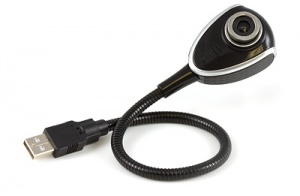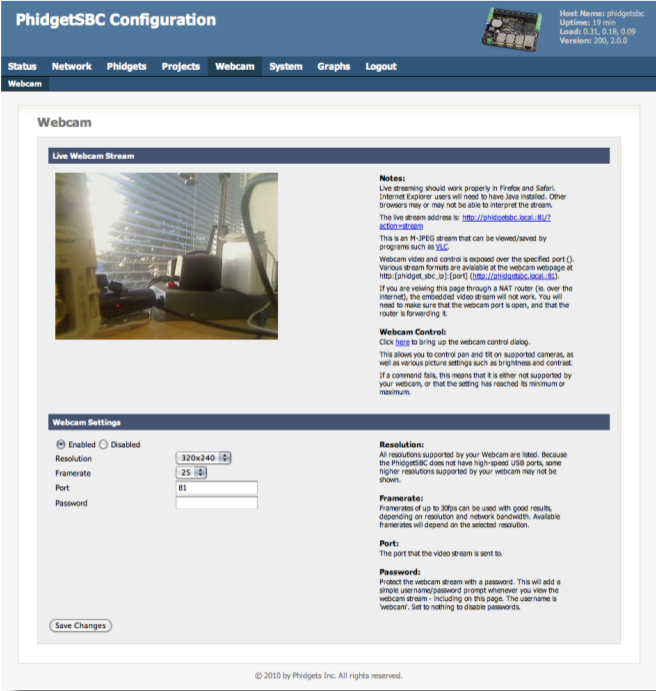USB Webcam Guide: Difference between revisions
No edit summary |
No edit summary |
||
| (25 intermediate revisions by 3 users not shown) | |||
| Line 1: | Line 1: | ||
[[Category: | {{#seo:|keywords=phidget SBC}} | ||
{{#seo:|description=The Phidget SBC can be upgraded with a webcam, making it useful for surveillance or computer vision.}} | |||
[[Category:IntroGuide]] | |||
__TOC__ | |||
==Introduction== | |||
[[File:3402_0_Web.jpg|300px|right|link=]] | |||
Webcams come in many forms, but the USB ones usually come as UVC (USB Video Class) devices. This guide gives a very brief overview of what they are and how to use them. | |||
<br clear=all> | |||
|} | |||
==Advantages== | |||
The advantage of UVC devices is their cross-platform compatibility, especially within the various flavours of Linux. | |||
*[http://en.wikipedia.org/wiki/USB_video_device_class Wikpedia] gives a good overview of their levels of compatibility. | |||
* Many devices other than the Phidget webcam use the same protocol, please refer to [http://www.ideasonboard.org/uvc/#devices a compatibility list]. | |||
==Use== | |||
A UVC device should be truly plug and play. Even on the [{{SERVER}}/products.php?product_id=1073 Phidget Single Board Computer], the drivers are already installed. You can almost immediately begin using video capture programs on your operating system to record video or pictures. | |||
Examples include: | |||
* Capture from Windows media players and creators | |||
* Use iMovie on macOS | |||
* Use Cheese on Linux ({{Code|sudo apt-get install cheese}}) | |||
However, these programs are usually graphical programs which don't help if you want to use the webcam in code. | |||
== | ===Code=== | ||
Regardless of your platform, a good place to start is [http://docs.opencv.org/ OpenCV]. It is a library for C that focuses solely on processing images and video. It also has bindings to other languages like Python. | |||
====Phidget SBC==== | |||
Any UVC webcam device should work interchangeably with any other UVC webcam device, So you don't have to use the Phidget one, you can find one that fits your needs. | |||
====Windows==== | |||
On Windows, [http://docs.opencv.org/ OpenCV] is your best bet. | |||
== | ====Linux==== | ||
On full Linux systems, you can possibly use OpenCV, though there have been some problems on standard Ubuntu distributions.<br> | |||
Alternatively, you can use the program {{Code|streamer}} which can then be used in code: | |||
:{{Code|sudo apt-get install streamer}} | |||
:{{Code|streamer -c /dev/video0 -b 16 -o output.jpg}} | |||
===Phidget SBC | ==Did You Know== | ||
The UVC standard outlines more than just picture taking - it can control pan, tilt, resolution, etc depending on the functionality for your camera. This is how the Phidget SBC controls what resolution is displayed on its [[1072_User_Guide#SBC Web Interface|Web Interface]]. | |||
If you want to play with these advanced features, and you own an SBC, you can look at the scripts in {{Code|/var/www/}} on the SBC. | |||
== | [[File:sbc_gs_webcam.png|link=|alt=|center]] | ||
Latest revision as of 16:41, 20 December 2024
Introduction

Webcams come in many forms, but the USB ones usually come as UVC (USB Video Class) devices. This guide gives a very brief overview of what they are and how to use them.
Advantages
The advantage of UVC devices is their cross-platform compatibility, especially within the various flavours of Linux.
- Wikpedia gives a good overview of their levels of compatibility.
- Many devices other than the Phidget webcam use the same protocol, please refer to a compatibility list.
Use
A UVC device should be truly plug and play. Even on the Phidget Single Board Computer, the drivers are already installed. You can almost immediately begin using video capture programs on your operating system to record video or pictures.
Examples include:
- Capture from Windows media players and creators
- Use iMovie on macOS
- Use Cheese on Linux (
sudo apt-get install cheese)
However, these programs are usually graphical programs which don't help if you want to use the webcam in code.
Code
Regardless of your platform, a good place to start is OpenCV. It is a library for C that focuses solely on processing images and video. It also has bindings to other languages like Python.
Phidget SBC
Any UVC webcam device should work interchangeably with any other UVC webcam device, So you don't have to use the Phidget one, you can find one that fits your needs.
Windows
On Windows, OpenCV is your best bet.
Linux
On full Linux systems, you can possibly use OpenCV, though there have been some problems on standard Ubuntu distributions.
Alternatively, you can use the program streamer which can then be used in code:
sudo apt-get install streamerstreamer -c /dev/video0 -b 16 -o output.jpg
Did You Know
The UVC standard outlines more than just picture taking - it can control pan, tilt, resolution, etc depending on the functionality for your camera. This is how the Phidget SBC controls what resolution is displayed on its Web Interface.
If you want to play with these advanced features, and you own an SBC, you can look at the scripts in /var/www/ on the SBC.

